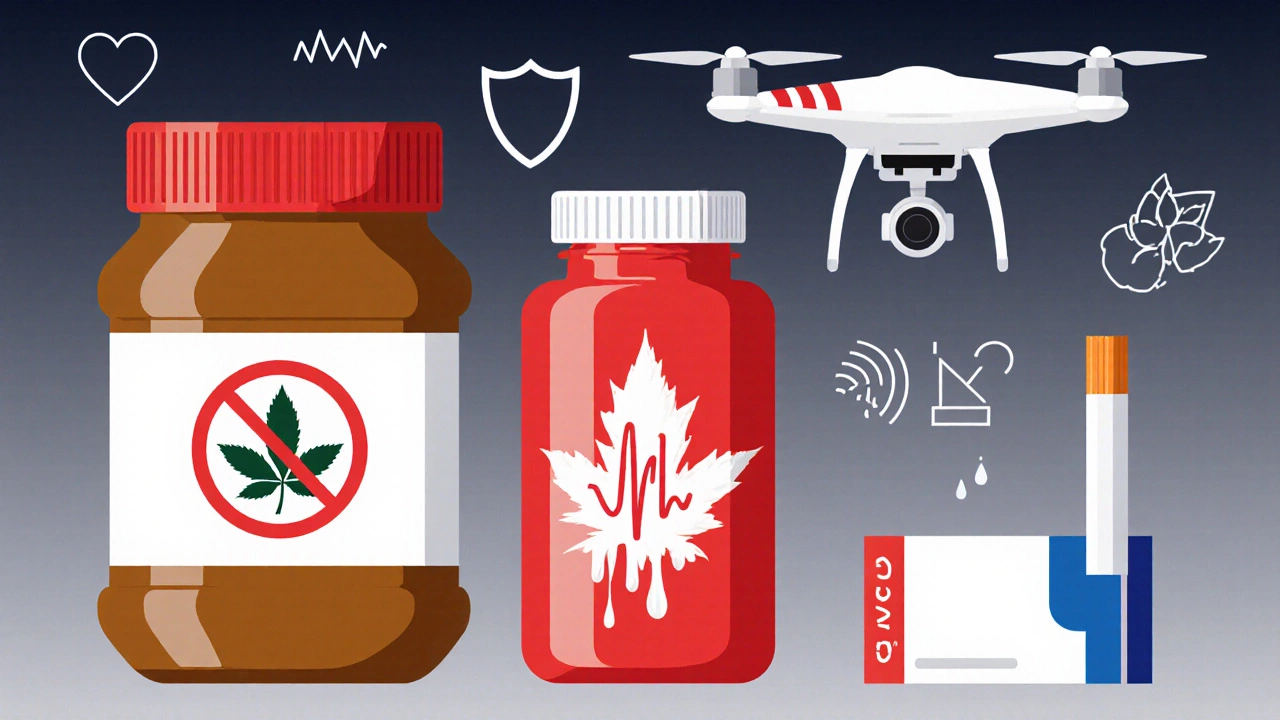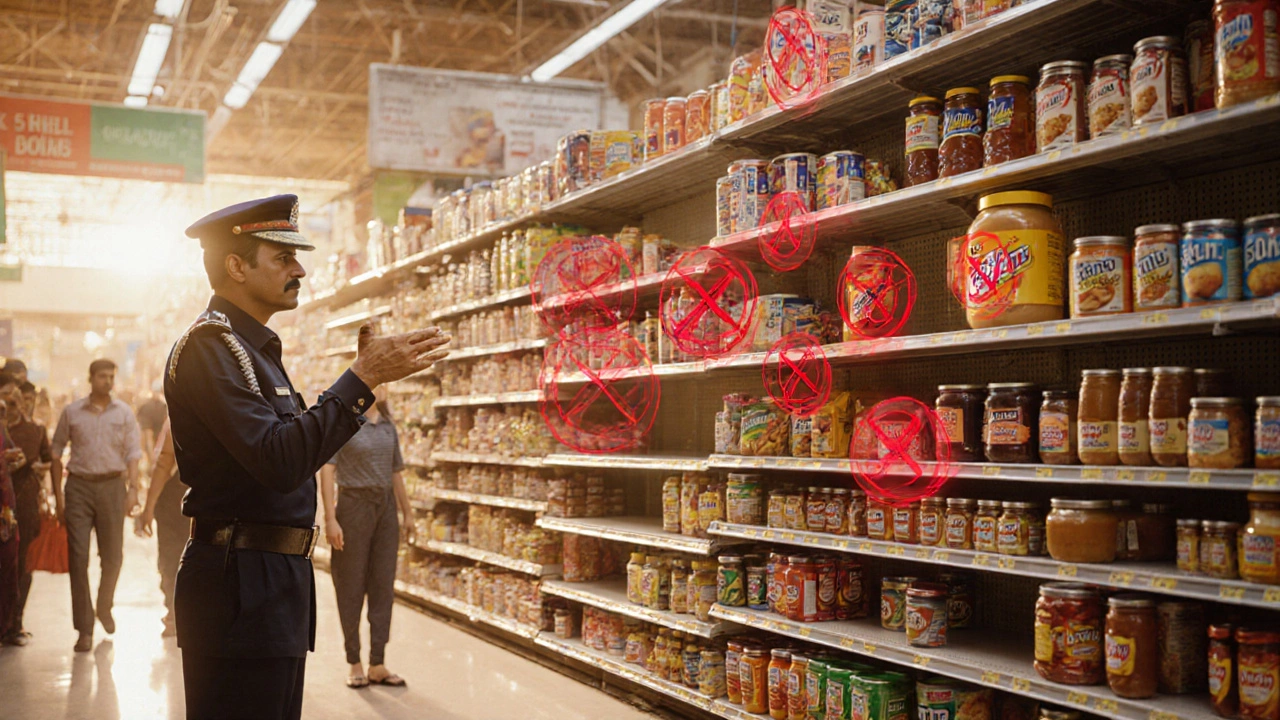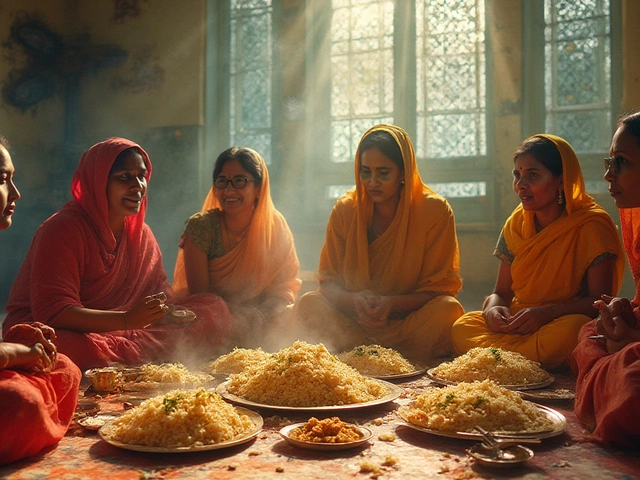India Product Ban Checker
Check If Your Product Is Banned in India
Enter a product name or HS code to verify if it's restricted for import or sale in India based on government regulations.
Results
Enter a product name or HS code to see if it's banned in India.
Ever wondered why you can’t find certain everyday items on Indian shelves? From popular snack brands to high‑tech gadgets, some products simply aren’t allowed to be sold in India. Below is a plain‑English breakdown of the most common product categories that face bans, why the rules exist, and what you can do if you need them.
Banned products in India is a collection of goods that the Indian government restricts or outright prohibits from being imported, manufactured, or sold within the country. These restrictions stem from health, safety, cultural, or economic concerns, and they are enforced by agencies such as the Ministry of Commerce and Industry, the Food Safety and Standards Authority of India (FSSAI), and the Central Drugs Standard Control Organization (CDSCO).Let’s walk through the biggest groups of products not sold in India, illustrate real‑world examples, and give you practical tips for travelers, expatriates, or businesses.
Why Does India Ban Certain Products?
India’s ban list isn’t random. The main reasons include:
- Public health: Preventing harmful substances from reaching consumers.
- Consumer safety: Avoiding items that could cause injuries or environmental damage.
- Cultural preservation: Protecting religious sentiments and traditional values.
- Economic protection: Shielding local manufacturers from unfair foreign competition.
- Regulatory alignment: Ensuring imports meet Indian standards for labeling, packaging, and composition.
Food & Beverages
Food is the most heavily regulated category because it directly affects health. The FSSAI maintains a list of prohibited items, which includes:
Food & beverages covers everything from snacks to drinks that fail Indian safety standards.- Foods containing ethylene oxide - a fumigant banned after studies linked it to cancer. \n
- Energy drinks with caffeine levels exceeding 32 mg per 100 ml - the limit set to curb heart‑related incidents.
- Imported honey that isn’t certified organic and contains pesticide residues over the permissible limit.
- Chewing gum that contains sugar substitutes like sorbitol in concentrations higher than 20% - considered a health risk for diabetics.
Popular international brands sometimes get caught off guard. For example, an American brand of flavored peanut butter was stopped because it contained a prohibited emulsifier. If you’re traveling, keep such items in your checked luggage and be ready to declare them.
Pharmaceuticals & Medical Devices
Pharmaceuticals are drugs, vaccines, and medical devices subject to CDSCO approval.Key bans include:
- Over‑the‑counter painkillers that contain codeine without a prescription.
- Weight‑loss supplements containing ephedra, a stimulant linked to heart attacks.
- Foreign‑made insulin that doesn’t meet Indian pharmacopeia standards.
- Medical devices lacking the mandatory Indian Medical Device (IMD) registration number.
Even if a drug is approved elsewhere, Indian law may still prohibit it. The anti‑obesity drug Orlistat, for instance, is sold only under strict medical supervision and cannot be marketed as a nutraceutical.
Cosmetics & Personal Care Items
Cosmetics refer to makeup, skin‑care, and hair‑care products.Common restrictions are:
- Products with >0.5% mercury - a heavy metal banned for its toxic effects on kidneys.
- Hair dyes containing lead acetate, which can cause hair loss and skin irritation.
- Cosmetics using the animal‑derived ingredient ‘talc’ that isn’t asbestos‑free.
- Shampoos with certain synthetic fragrances that have failed the Indian odor‑threshold test.
Many well‑known Western brands have reformulated their Indian lines to comply, but the original foreign formulations may still be restricted.

Electronics, Media & Software
Electronics include gadgets, media, and software that fall under the Department of Telecommunications (DoT) and the Ministry of Information & Broadcasting.- Radio frequencies used by imported drones that interfere with Indian air‑traffic control.
- Smartphones without mandatory IMEI tamper‑proof chips - a security measure against fraud.
- Video games that glorify violence against Indian national symbols - these may be blocked under the Information Technology (IT) Rules.
- Software that encrypts data without a valid government licence; such tools are classified as “restricted cryptographic software”.
When you buy overseas electronics, double‑check that they are “Indian‑certified” or that the seller provides a compliance certificate.
Tobacco, Alcohol & Related Products
Tobacco & alcohol are heavily taxed and regulated.- Flavored cigarettes and e‑cigarettes with nicotine concentrations above 20 mg/ml - deemed a public‑health threat.
- Alcoholic beverages with a label that does not display the mandatory “Alcohol - Consumption is prohibited for minors” warning.
- Imported cigars that do not meet Indian packaging size standards (minimum 5 grams per stick).
- Non‑Indian spirits that lack an Import‑Export Code (IEC) from the Directorate General of Foreign Trade.
These rules often cause delays at customs, so travelers should keep receipts handy and be ready to surrender the items if asked.
Pesticides, Chemicals & Hazardous Materials
Pesticides & chemicals fall under the Central Insecticides Board and the Hazardous Waste (Management and Handling) Rules.- Organophosphate pesticides with acute toxicity above the permitted LD50 level.
- Non‑approved industrial solvents like benzene in concentrations over 1%.
- Import of any plasticizer containing ‘phthalates’ that exceed the 0.1% limit set for toys.
- Carbonated drinks that use itaconic acid as a preservative without Indian approval.
Farmers and manufacturers often face difficulties sourcing specific chemicals, prompting them to seek Indian‑approved alternatives.
Cultural, Religious & Heritage Items
Cultural artifacts include statues, religious symbols, and traditional garments.- Imports of ivory, rhino horn, or any wildlife product listed under CITES - absolutely prohibited.
- Religious texts that contain content deemed offensive to any major Indian faith.
- Traditional clothing made of animal hair that does not meet animal‑welfare standards.
- Antique artifacts that lack a certified provenance report - these may be held for investigation.
The purpose is to protect India’s cultural heritage and comply with international wildlife trade laws.

How to Verify If a Product Is Restricted
Before you ship or buy something, follow this quick checklist:
- Visit the official FSSAI or CDSCO website for the latest prohibited list.
- Search the product’s HS‑Code (Harmonized System Code) on the Indian Customs portal; a “Restricted” flag will appear if applicable.
- Check for a mandatory India Import Clearance Certificate - required for pharmaceuticals, cosmetics, and certain chemicals.
- Ask the seller for an “Indian Conformity Certificate” (ICCS) for electronics.
- If in doubt, contact a licensed customs broker; a short call can save you weeks of clearance delays.
Tips for Travelers, Expats, and E‑Commerce Sellers
- Declare everything: Undeclared items can lead to fines up to 5× the product’s value.
- Keep original packaging: Customs officials rely on labels to verify ingredients and HS‑Codes.
- Use Indian‑approved substitutes: For example, replace foreign‑made nicotine patches with those cleared by the Ministry of Health.
- Stay updated: India revises its ban list at least twice a year; subscribe to the Ministry’s newsletter.
- Understand “grey‑area” products: Some goods, like certain dietary supplements, are not outright banned but require a label review before sale.
Comparison Table: Major Banned Product Categories
| Category | Typical Example | Regulatory Authority | Main Reason for Ban |
|---|---|---|---|
| Food & Beverages | Peanut butter with prohibited emulsifier | FSSAI | Health safety (contaminants) |
| Pharmaceuticals | Ephedra‑based weight‑loss pills | CDSCO | Adverse health effects |
| Cosmetics | Hair dye containing lead acetate | FSSAI / Ministry of Health | Toxicity concerns |
| Electronics | Drone using non‑approved radio frequency | DoT | Air‑traffic safety |
| Tobacco & Alcohol | Flavored cigarettes >20 mg/ml nicotine | Ministry of Health | Public‑health protection |
| Pesticides & Chemicals | Organophosphate pesticide above LD50 limit | Central Insecticides Board | Environmental & health risk |
| Cultural Artifacts | Ivory carvings | Ministry of Environment | Wildlife protection (CITES) |
Bottom Line
India’s ban list is a mix of health safeguards, cultural preservation, and market‑protective measures. Knowing which products fall into the prohibited bucket helps you avoid costly customs hassles, stay compliant, and make smarter buying decisions.
Frequently Asked Questions
Can I bring a small amount of a banned food item for personal use?
Personal use doesn’t automatically exempt you. If the product is on the prohibited list, customs can seize it regardless of quantity. The safest route is to leave it at home or verify a specific exemption in advance.
How often does India update its banned‑product list?
The list is reviewed twice a year, typically in March and September, but urgent updates can happen anytime if a new health risk emerges.
I’m an e‑commerce seller - what documentation do I need for restricted cosmetics?
You’ll need a Certificate of Analysis (CoA) from an NABL‑accredited lab, an Indian Cosmetic License from the FSSAI, and a label that complies with the Packaging and Labeling Rules (including ingredient list, batch number, and expiry date).
Are there any “grey‑area” products that aren’t outright banned but need special clearance?
Yes. Items like dietary supplements, herbal medicines, and certain “natural” cosmetics often require a label approval from the FSSAI before they can be marketed, even though they’re not listed as prohibited.
What happens if I accidentally import a banned product?
Customs will confiscate the goods and may levy a fine up to five times the product’s value. In serious cases, you could face a legal notice and a ban on future imports.






Write a comment